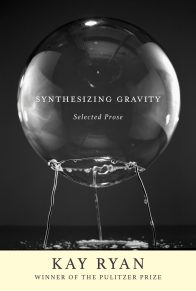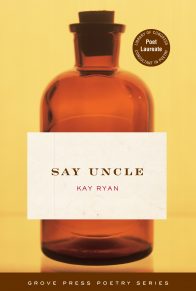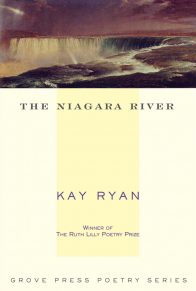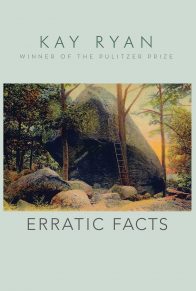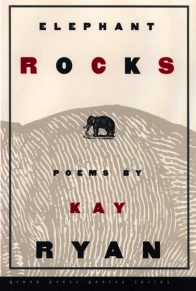“A lifelong Californian (and US poet laureate from 2008-2010), Ryan creates poetry that is spare, laconic, awash with word play, but with a fierceness underneath. This collection frames the brilliance of her career.” —David L. Ulin, LA Times
“Ryan . . . may well be the oddest and wisest poet to hold that prestigious post. Her tiny, skinny poems back a punch unlike anything else in contemporary poetry, though not unlike haiku, if haiku could be cut with a dash of Groucho Marx. This, her first retrospective volume, which also contains a book’s worth of new poems, is a much-needed introduction to the work of one of our best and most accessible poets. She asks the necessary questions hiding just beneath the obvious ones . . . Pithy poems manage to encapsulate far more than their few words should hold . . . sassy, smart and deep as they are hilarious, Ryan’s poems are among the best.” —Publishers Weekly (starred review)
“Ryan’s poems are as slim as runway models, so tiny you could almost tweet them. Their compact refinement, though, does not suggest ease or chic. Her voice is quizzical and impertinent, funny in uncomfortable ways, scuffed by failure and loss. Her mastery, like Emily Dickinson’s, has some awkwardness in it, some essential gawkiness that draws you close . . . The Best of It is a generous and nearly career-spanning collection of her verse, a greatest-hits album of a sort . . . you can’t help consuming [her] poems quickly, the way you are supposed to consume freshly made cocktails: while they are still smiling at you. But you immediately double back—what was that?—and their moral and intellectual bite blindsides you.” —Dwight Garner, The New York Times
“Melancholy lucidity is Ryan’s greatest gift, and it can be heard in all her most successful poems. But her most startling discovery is that melancholy, with its tendency to brood and spread, is best contained in a form that is tight, witty, almost sprightly sounding. Her poems are often built on the logic of the pun, taking an ordinary word or dead cliché as a title and then jolting it to unexpected life.” —Adam Kirsch, The New Yorker
“Ryan’s poems are consistent delights. They fizz with euphonies, they crackle with rhyme and off-rhyme—they are marvels of compact, slightly bitter wit—Ryan’s images come with pleasing details, but she never describes for description’s sake: Rather, all her images are emblems, sources for lessons or metaphors for beliefs . . . Ryan’s poems are what Robert Frost said all poems must be, momentary stays against confusion. Ryan’s poems are, and deserve to be, popular, in the sense that many people enjoy them—they are the opposite of avant-garde—but they are the opposite, too, of the popular verse that says everything will be alright.” —Stephen Burt, San Francisco Chronicle
“When she’s at the top of her game, [Ryan] has the uncanny ability to construct a tiny word-mechanism that produces the experience of genuine wonder . . . In the utter complexity of her vision and lyricism, I’m reminded of those mechanical devices of the ancient world meant to show us our place among the stars and help us navigate the uncharted darkness beyond. And in the very best examples, Ryan’s poems do precisely that.” —Steven Ratiner, The Washington Post
“Everything [Ryan’s] eye falls upon takes on a brisk, beautifully complete clarity. Her tidy lines disguise an enormous intelligence and tonal warmth: a ferocious capacity for finding the essence of things. The Best of It reveals that right before our eyes Ryan has become a classic American poet . . . few poets know how to compress thought so elegantly, while simultaneously keeping their lines so loose and vernacular . . . Ryan is so sure-handed that the book is consistently good, her preoccupations reassuringly perpetual.” —John Freeman, Los Angeles Times
“No one writes like Kay Ryan—a sort of dashless Dickinson for the 21st century. Spanning 16 years, this compendium of hyphen-thin poems somehow feels historic and prescient.” —Dean Rader, San Francisco Gate (Best Poetry Books of 2010)
“Kay Ryan’s poems please the ear and tickle the mind. Some begin with close observations of life and travel . . . some begin with clichés or hypotheses, which Ryan examines from angles we, the readers, hadn’t considered before . . . wringing out its essence.” —Concord Monitor
“[Kay Ryan] announced 2011 Pulitzer Prize winner . . . As [Billy] Collins said, ‘Her poems embody probably more than any living poet an attribute that tends to distinguish poetry from all other forms, and that is compression. Her poems are incredibly compact. I’m not just talking about shortness—there’s a kind of density of meaning and particularly a density of sound.’” —Oliver Gettell
“Winner of this year’s Pulitzer Prize, Ryan’s . . . book is a . . . career-spanning showcase of her taut, unconventional verse and its capacity for finding the essence of things.” —Ihsan Taylor
“If the job of poetry is to distill language and experience, there are few greater contemporary masters of the form than Ryan. She excels at aphoristic wit, yet reveals an intensity of emotion . . . You won’t find any clutter in her work, which never fails to surprise, enlighten and delight.” —Carmela Ciuraru, Newsday
“Ryan’s verse reminds one not so much of conventional narrative poems as of some cunningly made artifacts . . . taken as a whole, The Best of It displays an astounding consistency of tone and quality . . . one of the many charms here is accessibility: the poems tend toward the bite-size, and their initial effect is of a pleasing briskness, free of the dense opacity and deliberate ‘difficulty’ that makes so much contemporary poetry into the readerly equivalent of a trip to the dentist . . . These gifts call to mind some illustrious predecessors, including Dickinson, Stevens, Moore and Frost. Despite the echoes, though, Ryan is so arresting and genuinely original that her book stays in the mind in a way unlike much contemporary poetry, so often impenetrable and self-absorbed. In today’s world of exploding self-expression and relentless ephemera, Kay Ryan sticks.” —Michael Lindgren, Cleveland Plain-Dealer
“Ryan’s oblique humor runs from grim to whimsical, from delighted to sardonic . . . Despite her desert beginnings, she cannot disavow her own talent and taste, her intelligence and achievement . . . From a life that has not been easy, she has mined nuggets that add to American poetic wealth.” —Helen Vendler, The New York Review of Books
“Ryan is one of the few contemporary poets to have imitators because she is one of the few truly compelling stylists now at work. Her voice is authoritative, confident, unfussy, exacting . . . she is astutely reserved, watchful, and understands that no one is special in his or her grief . . . so many ‘new and selected’ volumes come out each year, but The Best of It is rare in being truly the best of the poet’s work so far. Kay Ryan is so disarming, so fresh and original, that she has earned her recent reputation as one of the very best poets among us.” —David Mason, The Hudson Review
“[Ryan’s] work is concise, exquisitely crafted, and explores the landscape of the mind, rather than personal experience. Those qualities set her poetry apart, as does her consistency. Every section lives up to the title. The poems never end where you think they will, yet they feel so right, so fully realized…she handles every topic with grace and confidence. The Best of It lives up to its promise and has the potential to change the way many American poets think and write.” —Elizabeth Lund, Christian Science Monitor
“Ryan is the poet of the possible, who keeps to the edges of words and thoughts, leaving emotions for others to find . . . [her poetry] is singular, playful as well as serious, forcing us to prick up our ears and listen.” —Bob Hoover, Pittsburgh Post-Gazette
“Kay Ryan is a distinctive and original voice within the rich variety of contemporary American poetry. She writes easily understandable short poems on improbable subjects. Within her compact compositions there are many surprises in rhyme and rhythm and in sly wit pointing to subtle wisdom.” —Dr. James H. Billington, Librarian of Congress
“Ryan is a masterful minimalist, choosing words with extreme care, gems to be appreciated with maximum concentration…Ryan has always been an acolyte of epigrams, a hallowed form of wisdom literature. Despite her short lines and pithy concessions, it’s only partly true to call her a minimalist, because she’s not the least bashful toward reality . . . Ryan’s poetry of incremental restoration appreciates awareness through aging and asserts the mind’s superiority.” —Anis Shivani, Kansas City Star
“Kay Ryan is an anomaly in today’s literary culture: as intense and elliptical as Dickinson, as buoyant and rueful as Frost. Her poems are exhilarating, strange affairs, like Satie miniatures or Cornell boxes. Their neologisms and rhymes are witty, their tone aphoristic, their metaphors often startling. There are poets who start with lived life, still damp with sorrow and uncertainty, and lead it toward ideas about life. And there are poets who begin with ideas and draw life in toward their speculations. Kay Ryan is this latter sort of artist. She starts with details, oddities, categories, then unscrews and rebolts them, magnetizes them so that in turn they draw all the bright filings the world throws out. Each of her poems is like a telescope that keeps the observer at a distance while focusing on her subject with a disconcerting intimacy. What she likes looking at are the edges of things, borders and transitions. Her skeptical imagination is pungent, her control masterful.” —J. D. McClatchy, The Vintage Book of Contemporary American Poetry
“Kay Ryan can take any subject and make it her own. Her poems—which combine extreme concision and formal expertise with broad subjects and deep feeling—could never be mistaken for anyone else’s. Her work has the kind of singularity and sustained integrity that is very, very rare.” —Christine Wiman, editor of Poetry and chair of the Ruth Lilly selection committee
“These are poems that inspire us with poetry’s greatest gifts: the music of language and the force of wisdom.” —Annie Dillard
“Kay Ryan’s poems produce that continued surprise and refreshment that we look for in real poetry.” —Richard Wilbur
“One of the great living American poets.” —The Poetry Foundation
“The Best of It, offers us [an] experience of change that remains grounded in concrete and specific concerns, both in terms of Ryan’s themes and in the long view that we get of her stylistic evolution over the last sixteen years. Ryan works on and against our expectations and assumptions about the world throughout this book, exploring the tension between changing and unchanged. [Ryan’s] handling of this tension is masterful, and productive of a pathos that leaves us refreshed.” —David Gruber, coldfrontmag.com
“Ryan’s use of Spartan structure and internal rhyme (‘recombinant’ is Ryan’s term) beg formal analysis, yet Ryan’s emphasis is on the turning point—the peripeteia in a balance of emotion, logic, and aesthic. Ryan floats her lines at even keel, we bob along as if in the bay, and then she tips the boat, not with a tidal wave, but a sudden lunge.” —John Reed, bookcritics.org





